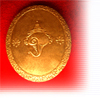 |
Articles Swathi Thirunal:Early childhood Swathi Thirunal as a patron of art Swathi Thirunal as an able administrator |
Early childhood: Garbhasriman
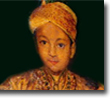 |
Rama
Varma was born as a savior of Travancore. There was no male
heir in the Travancore Royal family and the threat of the infamous Doctrine
of Lapse loomed over this tiny state. Nobody in Travancore, including
the then British resident Col. Munroe wanted the kingdom to be annexed
to |
Then
the Queen Regent, Rani Gouri Lakshmi Bayi conceived. Munroe informed
his superiors that a heir is born to Travancore
much before the baby was born. Garbhasriman,
as he was popularly known, Swathi Thirunal
was acclaimed a king even before his birth. |
The most famous lullaby in Malayalam, Omanathingal
Kidavao...
was written when Swathi was born. This poem
by Erayiamman Thampi is still very
popular in Kerala. Son of Rani Gauri Lexmi Bai who looked after the affairs of the State as Queen Regent and Raja Raja Varma Koyi Thampuran of Changanassery royal family, Swathi Thirunal |
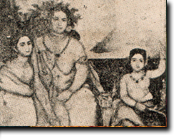 |
showed his prodigy from early years. His mother Rani Laxmi Bayi, the Queen Regent, passed away when the child was hardly two, leaving him in the care of her sister, Rani Parvathi Bayi, who took over as the Queen Regent,during the period of his childhood days. Regent Partvathi Bayi was very careful about the education of the young prince. Tutors were appointed for teaching him different subjects and languages. She was far-sighted about the need for having knowledge of different languages in the context of an emerging multilingual polity and administration. Thus Sanskrit, Tamil, Telugu, Kannada, Persian, Hindi and Marathi were taught to him, besides the mother-tongue. The extraordinary intellectual exuberance of Swathi Thirunal and the deeper interest and insight he showed in music and literature, amazed his tutors, and the British personalities who visited the state. Rama Varma was very attached to his aunt and shared a very special and warm relationship with her till the end. |
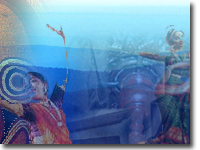 |
Swathi Thirunal's reputation as a patron of cultural activities attracted several musicians, dancers and writers from all parts of India to his court . Eraimman Thampi, whom we refer to as the court poet, was also a great musical composer. Many of the songs of Thampi have become immensely popular on account of their pleasing melody as well as their sweet language. |
Among the musical celebrities who adorned his court were four brothers Vadivelu, Sivanandam, Chinnaiah and Ponniah, all experts and exponents in several branches of music and dance. Vadivelu was one of the best musicians and dancers of his time. He had marvelous skill in playing the violin, and the Maharajan was pleased to present him with an instrument made of ivory. But some people in recent times attribute some of the musical works of Maharaja to these brothers. Noted Veena maestro Balachander was the man who pioneered this theory. This is absolutely baseless, Maharaja's manuscript copies are found, and all his compositions contain the stamp of devotion to Sree Padmanabha. Among the experts in instrumental music in SwathiThirunal's court was Ananthapadmanabha Goaswami, popularly known as Meruswami. Meruswami was a celebrity in the court of the Tanjore Raja, and he was a great exponent of Harikatha and Hindustani Music. The Maharaja sanctioned a handsome pension for him and permission for the free use of a palanquin. The Maharaja's appreciation of the Hindustani music was responsible for organizing a troupe of Hindustani artistes in the palace. There were in that troupe, three dancers and a Hindustani musical exponent, Allaudin from Mysore. Another musician from the North was Syed Sulaiman, a Pathan, whose special ability was in playing Swarabath, a musical instrument. Sarangi players also received his encouragement . Chintamony of Tanjore was a great exponent of this. The Maharaja's love for music was not confined to pure music, but it also comprehended the closely allied art, dance. He had great interest in Bharathanattyam and Mohiniyattam. Bharathanattyam attracted the special attention of the Maharaja even from his childhood. Great exponents of that art like Nagaratnam of Srirangam, Pichu Bhagavather from Tanjore were invited to Thiruvananthapuaram for performances and they were generously rewarded. Vadivelu, whom we mentioned earlier, was the master of Bharathanattyam troupe and he is popularly known as Nattuvan Vadivelu – Nattuvan means dancer. Under the benign patronage and encouragement of the Maharaja, Bharathanattayam won immense popularity among the people of Travancore. Several dancers came from Tanjore in those days and settled down in Trivandrum getting due encouragement from the palace. Vadivelu, Meruswami and others about whom mention has been made, were the important musicians attached to the court of the Maharaja. But there were a host of minor figures who also enjoyed the patronage of Maharaja. The palace records of the times furnish eloquent proof of the rewards and presents awarded by the Maharaja to musicians and experts in instruments. Among them may be mentioned, Anantharaman and Mukundaraman of Mysore, Sivarama Sastrikal of Kalahasti, Lakshmana Das of Gwalior, Vellabarayar of Tanjore, Halavati an expert of Mohiniyattam fromTanjore and Parameshwara Bhagavathar of Palakkad. There were several gifted musicians in Travancore who were contemporaries of the Maharaja. The foremost among them was, no doubt, Govinda Marar, who has won fame as Shadkala Govinda Marar. He is regarded as the greatest musician born in Kerala, who was able to win the approbation of his great contemporary Sri Thyagaraja, the celebrated musician and composer of South India. There were several other musicians who were attached to the court of the Maharaja. It reveals a remarkable fact that in those days, there were a large number of eminent musicians in Kerala, noted for their special skills, both in vocal as well as instrumental music. The ancient musical tradition of Kerala continues almost unbroken. Sangitaratnakaram Sri Rama Sastrigal, Kavirajan Avanavanjcherry Krishnan Bhagavathar and others, deserve special mention. The Maharaja had in his court, eminent poets like Kilimanur Vidwan Koyi Thampuran and Eraimman Thampi and great scholars like Simhadri sastri of Mysore, and Krishnappa Sastri of Hyderabad, Vasudeve Acharin of Kumbhakonam and Krishna Sastri of Tanjore. There were also great astrologers like Sankaranantha, a native of North Malabar, who won great fame as an adviser of Ranjit Singh, Lion of Punjab, and finally became a judge of the High Court of Travancore and a courtier of the Maharaja. There were likewise, equestrians, magicians, gymnasts, sculptors, physicians and painters. Dasini, a painter from Tanjore, was employed by the Maharaja for painting mural pictures in the Sree Padmanabha Swami Temple.
The stories need to be taken as a reflection on the attitude of the Maharaja towards literature, for he was himself a great scholar in several languages- Sanskrit, Tamil, Telugu, Marathi, Hindi, Persian, English, besides Malayalam, and a good poet. It is also noteworthy that two of his greatest courtiers, Vidwan Koyi Thampuran of Kilimanoor and Eraimman Thampi were great literary jewels. Koyi Thampuran is well known as the author of a beautiful Kathkali work 'RAVANA VIJAYAM', and Eraimman Thampi one of the best poets of Malayalam. However, it may not be wrong to say that Swathi Thirunal showed an excessive fondness for music, and that was responsible for creating a feeling of jealousy in the minds of other artistes The patronage given by the Maharaja to music and the encouragement given to the musicians and artistes deserve the highest praise. The Maharaja's achievements are gratefully remembered, and his example will ever serve to inspire the world in the promotion of learning and fine arts. His, memory will forever be cherished as one of the greatest patrons of music and art in South India. |
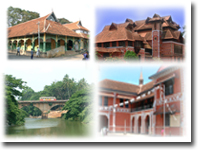 |
Maharaja
Swathi Thirunal's reign was a period of transition. The State of Travancore
was steadily losing its independence to the growing power of the British
Empire. More and more of the administrative powers were abrogated by
the British Resident. To the Maharaja who inherited the proud traditions
of one of the oldest royal families in India, the British interference
was almost intolerable. |
His spirit of freedom struggled in vain before the hegemonic British power, till his death in 1847.Inspired by the highest ideals of the Dharma Sastra and motivated by the welfare of the people, his ambition was to build upon the foundations laid by his illustrious ancestors and enhance the prosperity of the State in a manner worthy of the traditions and suited to the conditions of his time. A great scholar and linguist endowed with rare artistic gifts, he was passionately devoted to arts and letters, but he always remembered that his first and foremost duty as Sri Padmanabha Dasa was to look after the affairs of the State and promote the well-being of his subjects. During the period of his mother Lakshmi Bai and his aunt Parvathi Bai, there was a change in the nature of administrative pattern, by which Colonel Munro combined in him the roles of the British Resident and the Dewan. Even then, the Administration under the able Colonel was notable for its efficiency. Steeped in Indian tradition and at the same time fully acquainted with the ideals and ideas of the West, Swathi Thirunal wanted to give the benefits of the best features of both the systems to his people and maintain efficient administrative system. The first act of the Maharaja as an administrator was to shift the Huzur Cutcherry (Secretariat) and other public offices from Kollam to Thiruvananthapuram with a view to securing more effective control in the discharge of official business. He also devoted personal attention in the transaction of all important affairs of State and kept a vigilant watch over the progress in the various departments. Reorganization and modernization of judiciary by the establishment of Munsiff courts, Zillah courts and an Appeal court at the capital was one of the early measures introduced by the Maharaja to improve the efficiency of judicial service in the state. The promulgation of a new code of regulations in 1835 on the British Indian model was another step in the same direction. The educational policy of the Maharaja shows him to be a far-sighted administrator. He laid the foundation of modern education in the State by establishing English schools and by offering employment to those having knowledge of that language. He realized that the prosperity of an agricultural country like Travancore depended on an efficient land revenue policy coupled with adequate facilities for transport and irrigation. The survey of the paddy lands of the state undertaken by the Government in 1837 (1012 M.E.) was one of the most beneficial measures to improve the lot of the tenants and cultivators. The land records prepared during that survey are valuable documents in deciding disputes and questions relating to landed properties even to this day. The organization of an engineering department with a special irrigation section at Nanjinad bears testimony to the Maharaja's commitment to infrastructure building. He was equally interested in promoting trade as may be seen from the abolition of minor duties on more than 160 articles. Several important institutions came into existence due to the personal interest of the Maharaja, and some of them like the Trivandrum Observatory, the Museum & Zoo, the Government Press, the State Library, etc. These institutions in Thiruvananthapuram have developed into premier institutions of the State. The charity hospital founded by him at Thiruvananthapuram laid the foundation for the Allopathic system of medical treatment in Travancore. These as well as several other measures adopted by him, show the keen interest he took in the administration of the State with a view to promoting all-round prosperity and advancement of the people. The importance he attached to his role as a ruler may be clearly seen from his attitude to the British Resident, General Cullen, who interfered with the administration, as well as from his dealings with corrupt officers. His relationships with General Cullen form a tragic episode in our history. Had the Maharaja been a weak ruler, content to abide by the directions of the representative of the imperial power, his life would have been far happier. But he appears to have had such a high sense of duty and self-respect as not to yield to unwarranted intervention. A man of the highest principles and character, he could not brook any delinquency or corrupt practice. The dismissal of Dewan Subha Rao from service furnishes a convincing example. Rao was the tutor of the Maharaja before he became the Dewan, but that relationship did not prevent the Maharaja from removing him from service when charges of corruption were leveled against him. It is particularly to be noted that the Maharaja did not change his mind even after a committee of enquiry exonerated the Dewan from the charges. Several other officers also met with the same treatment at the Maharaja's hand. He set his face sternly against any kind of nepotism and favoritism, which spoiled the administration. When Dewan Reddy Rao appointed two of his sons in his office against a specific warning given to him, the Maharaja dismissed them. Reddy Rao himself was asked to render his resignation or to submit himself to a public enquiry when he was accused of having accepted bribery. These are a few among the numerous instances revealing his high sense of public morality and purity of administration. Although the Maharaja's title to permanent fame, from the modern point of view, rests more on his contribution as a composer and a patron of arts and letters, his greatness as an administrator deserves grateful recognition. He was a scholar, musician and poet, but by birth and temperament he was every inch a king who never forgot the dignity of his position and was ever anxious to discharge his sacred duties as Sri Padmanabha Dasa, Servant of Lord Padmanabha, the presiding deity of the Travancore royal house.
|

